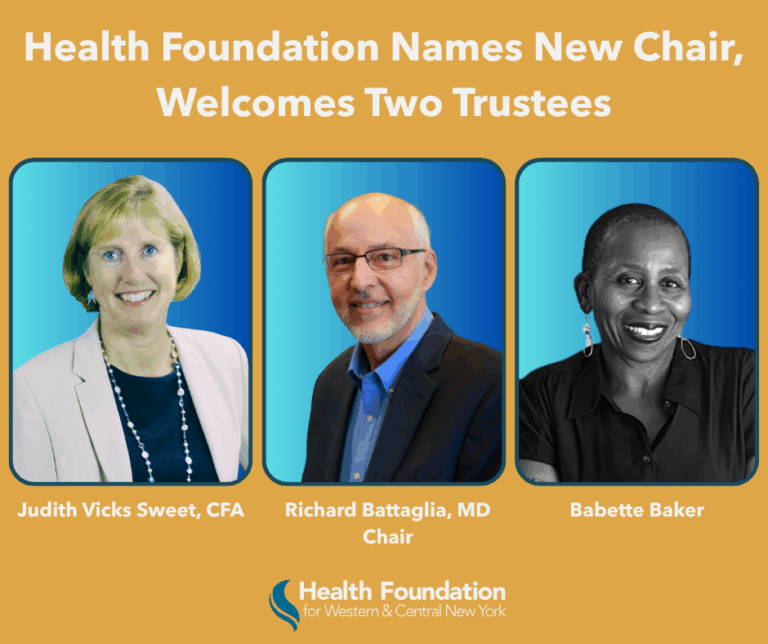November is National Family Caregivers Month—a chance to recognize and honor the Americans who take care of others. At the Health Foundation for Western & Central New York, one of the ways we strive for health equity is by supporting family caregivers, especially those who care for older loved ones. In 2020 we partnered with the Ralph C. Wilson, Jr. Foundation to launch Exhale, an initiative focused on creating meaningful respite opportunities for family caregivers. One of the participants in Exhale’s inaugural phase was the West Falls Center for the Arts, which operates the Musical Memories Café in southern Erie County, New York.
The power of music
Something magical happens on the first and third Wednesday of each month at the Musical Memories Café in West Falls, where adults living with Alzheimer’s disease, along with their caregivers, can take a much-needed break from the day-to-day. The café offers visitors a nourishing midday meal and a live musical performance—at no cost.
Whether it’s bluegrass, folk, classical, or jazz, the music invites everyone to sit back, listen, and simply relax. In many instances, the café-goers are inspired to sing along or even get up and dance.
Carolyn Panzica, executive director, tells the story of a woman with advanced dementia who visits the café regularly. Her family brings her because it’s the only recreational outing that meets her specific needs as her condition deteriorates. And yet, while her ability to recall significant moments in her life is severely impaired, when a particular song is played, she remembers every single word. And she sings along. This gives Panzica reason to smile. She’s proud that the Musical Memories Café is serving a meaningful purpose, especially when she witnesses remarkable reactions and interactions among visitors like this.
The strength of community
Memory cafés were first conceived in 1997 by Bere Miesen, a Dutch geriatric psychologist who recognized the therapeutic effect of music on those living with Alzheimer’s disease and dementia. But as the team at the Musical Memories Café quickly discovered, the benefits don’t stop there.
Panzica explains how the café has also become a supportive social outlet for caregivers.
Not only do they get a respite from their responsibilities, they can also connect with other caregivers and decrease their own sense of isolation. Indeed, rather than drop off their loved ones, caregivers stay at the café and join in the music and the “breaking of bread,” as Panzica describes it. For a few hours, they might even feel like they did 10 years ago—before a family member’s health took its toll and life became complicated. Panzica says that some caregivers keep coming back even after their loved ones have died. It’s a testament to a special community where deep bonds are forged through a hot meal, empathetic conversations, and an afternoon of music.
During the Covid-19 pandemic, when crowds couldn’t gather safely under one roof, Panzica and her team kept the mission of the Musical Memories Café going strong. They found creative ways to bring music and joy to the community, including live-streaming performances and bringing “porch concerts” right to the homes of families. Three years later, the café is alive with human energy and routinely filled to capacity. The concept of music as therapy and social connection has become so popular, Panzica and her team have expanded their outreach to three more locations: one in Amherst, one in Lockport, and another in the city of Buffalo.
Even though Dr. Miesen shared his concept in the 1990s, it wasn’t until 2008 that the first memory café opened in the United States. Today there are several hundred memory cafés throughout the country. Panzica hopes that even more people will be inspired to act. She and her business partner, Steve Harvey, are launching a website with resources that include a downloadable toolkit for anyone in the country who wants to start a memory café.
A growing segment of our unpaid workforce
In 2020, one in five people in the United States—roughly 53 million people—were providing unpaid care to an adult with health or functional needs, according to a study conducted by the National Alliance for Caregiving and the AARP. Family caregiving has been shown to have a significant impact on the emotional, physical, and financial health of caregivers. In fact, 23 percent of respondents said that caregiving negatively impacted their own health. Between 2015 and 2020, the number of people giving unpaid care to an adult had grown by more than 8 million.
According to the Alzheimer’s Association, in 2021 caregivers provided roughly 16 million hours of care to adults with Alzheimer’s disease or dementia, reflecting an economic value of more than $271 billion in unpaid labor.
We know that our nation’s caregivers play a critical role in the lives of the people they love. As we celebrate National Family Caregivers Month, it’s worth remembering that they’re also an essential part of our healthcare infrastructure. They need our support all year long.
The Exhale Family Caregiver Initiative
The Exhale Family Caregiver Initiative, which continues to support Musical Memories Café, is funded by the Ralph C. Wilson, Jr. Foundation and the Health Foundation and managed by The Philanthropic Initiative (TPI) with support from Teresa Lawrence of International Deliverables. Thanks to support from the Ann Arbor Area Community Foundation, Exhale recently expanded into southeast Michigan. To date, 16 innovative respite projects have been launched in western New York and southeast Michigan through the Exhale program. The Health Foundation is partnering with the Wilson Foundation to further enhance Exhale and will roll out a new Memory Café program.
New funding opportunities for caregivers
In 2015, The Ralph C. Wilson, Jr. Foundation established endowment funds at the Community Foundation for Greater Buffalo to provide annual support for initiatives that reflect the personal passions of Mr. Wilson, including caregiving.
The Community Foundation for Greater Buffalo is now accepting applications for the 2024 Ralph C. Wilson, Jr. Legacy Funds competitive grant process. This opportunity includes funding for caregivers—whether paid, voluntary, or family—who are unable to fully care for themselves and are part of an underserved community. Preference will be given to requests that provide support to caregivers of older adults. Applications are due December 1, 2023. You can learn more and apply here.




